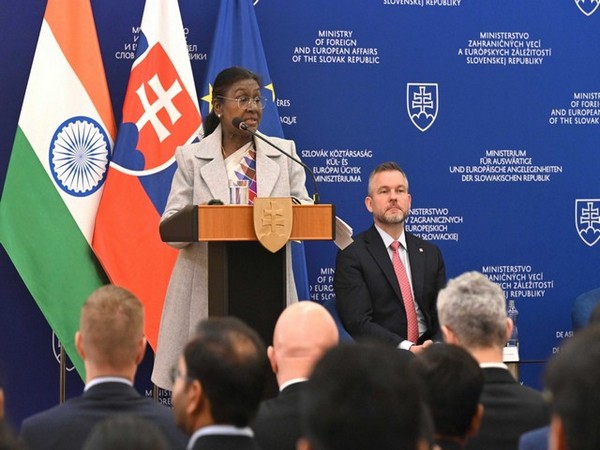PM Modi's New India based on women development, holistic education
Oct 05, 2021

New Delhi [India], October 5 : The two pillars of the New India envisioned by Prime Minister Narendra Modi is based on women development and holistic education policy.
The realization that education and women are two pillars to be enjoined in the push for development has taken roots with regular policy decisions that are slowly but surely ensuring an empowered and educated India, reported Saudi Gazette.
"The progress of humanity is incomplete without the empowerment of women," Modi has repeatedly espoused. And a women-led national transformation has been a defining feature under his government.
These two pillars will emerge as the foundation of the national transformation en route to the realization of New India.
The new National Education Policy (NEP-2020) that was unveiled last year proposed sweeping changes in school and higher education. The policy is aimed at revamping the education system and turning it into a much more future-oriented and job-focused initiative as well, reported Saudi Gazette.
The NEP-2020 is a visionary education policy of the 21st-century that was launched with the aim to bring out the capabilities of each student, universalize education, build capacities and transform the learning landscape.
It has the ultimate purpose to make education holistic, affordable, accessible and equitable, Saudi Gazette reported.
A major step undertaken during this time period, in the middle of the raging pandemic, is the shift to online education. The new educational policy has encouraged schools to explore methods that could stand as alternates to the conventional methods of teaching.
Moreover, the PM e-Vidya program ensures that reading and writing through the online mode continuing with television and community radio options only supplementing the existing methods.
In addition, the One Nation One Digital platform has ensured that e-content of study material items based on the school curriculum has been made available in over 32 languages.
Also during the pandemic, examinations were held online and different mechanisms were implemented to cater to the changing realities as well.
Multi-disciplinary entrance examinations were all held online to ensure no academic year was wasted because of the pandemic either, with a set of guidelines and regulations coming in from the University Grant Commission (UGC).
A portal created specifically for online learning was embedded with over 800 degree and diploma courses, with more than 54 lakhs students have registered for it as part of SWAYAM.
Similarly, NISHTHA is one of its kind programs -- the world's largest integrated teacher training program; it is geared towards improving school education.
Additionally, there is a renewed focus on numerous forums that have been created as part of larger national digital education architecture.
PM Modi's government has not only focussed upon education but has also embarked on several measures to better the condition of women across different segments of society.
On the social front, the Indian government has taken positive steps towards ensuring that the societal condition of women changes for the better.
Taking a cue from the historic judgment of the Constitution Bench in the Shayara Bano case wherein the practice of triple talaq was deemed manifestly arbitrary, the government of India enacted a law abolishing the practice, reported Saudi Gazette.
On the economic front too, things have improved for the better. Through amendments to existing law, women have been allowed to work night shifts in metropolitan cities, thereby increasing the scope of their opportunities.
Further, to increase their access to financial capital, the Stand Up India scheme possesses a provision of enabling every bank branch to grant a loan of Rs 10 lakh to Rs 1 crore to women only.
With regard to small businesses, an overwhelming majority i.e. around 70 per cent of beneficiaries of the MUDRA scheme have been women who have gained access to loans between Rs 50,000 to Rs 10 lakh. Also, PSUs have been mandatorily tasked to procure at least 3 per cent of their required products from women-led or women-established MSMEs, reported Saudi Gazette.
This has led to a clear spike in the presence of women in the Micro, Small and Medium Enterprises (MSME) sector wherein more than 32,000 women entrepreneurs registered on the government e-Marketplace (GeM) within few months of its announcement, and the number seems to be constantly rising.
Also, the opening up of the Permanent Commission in all three wings of the armed forces for women will be remembered as a historic step towards ensuring gender parity in a segment dominated by males.
With schemes like the 'Beti Bachao, Beti Padhao', India is striving hard to save the lives of its girl children and protect & enrich them with all its resources.
With these policies in place, India's youth and women are set to fuel the nation's developmental aspirations of a 21st-century's Self-Reliant India and to make India a vibrant country, holding its own in the global community, in every facets of progress.


















